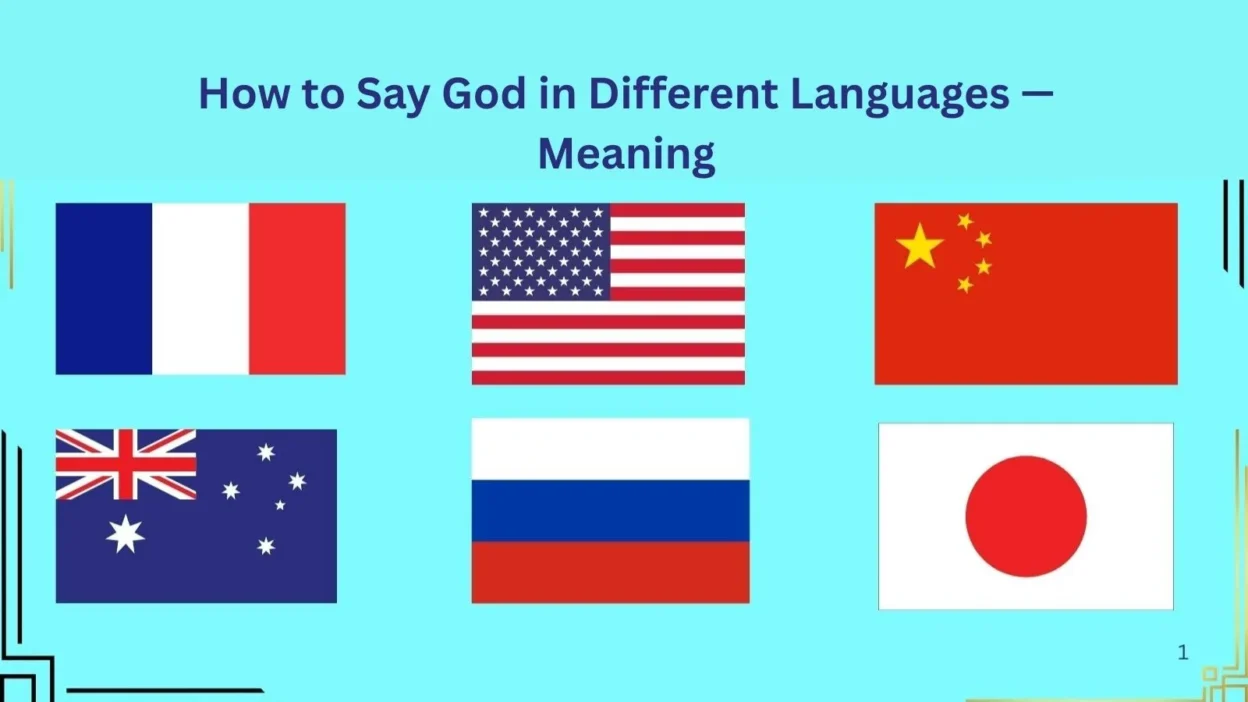Why Are You Searching for “How to Say God in Different Languages”?
If you’ve ever found yourself wondering how to say “God” in different languages, you’re not alone. Whether you’re traveling, learning a new language, writing a story, practicing interfaith communication, or simply exploring the world’s spiritual vocabulary — this article is your perfect guide.
Many people search for this phrase out of curiosity, religious interest, cultural exploration, or to respectfully address diverse beliefs. Whatever your reason, this post will answer your question thoroughly and give you the right word, its pronunciation, and even its usage in context.
You’ll walk away not only knowing the word for God in many languages, but also how to use it correctly when speaking with people of different cultures or faiths.
What Does the Word “God” Really Mean?
The term “God” generally refers to a supreme being, creator, or higher power believed to govern the universe. However, its meaning can vary by language, religion, and culture.
Some languages have specific names for a monotheistic God, while others have words for multiple deities in polytheistic systems.
So, while the English word is “God,” other cultures might use names that reflect their religious philosophy or linguistic roots.
How to Use the Word “God” in Conversations
Before we dive into translations, let’s look at how the word “God” is typically used:
Example Phrases:
- English: God bless you.
- Arabic: Insha’Allah (If God wills).
- Spanish: Gracias a Dios (Thank God).
- French: Mon Dieu! (My God! – often an exclamation).
- Hindi: Bhagwan ka shukriya (Thank God).
These phrases show that the word “God” isn’t just about religion—it’s woven into everyday language, expressing emotions, gratitude, hope, and surprise.
الله (Allah) & “Queen” in Different Languages 👑🌍 | Meaning, Usage & Cultural Insight
When people search for words like “الله (Allah)” and terms for “queen” in different languages, they’re often exploring a blend of spiritual depth and cultural richness.
The word “Allah”, meaning God in Arabic, is not just a name—it represents the central figure in the Islamic faith. Meanwhile, “queen” is a word that symbolizes royalty, power, dignity, and femininity.
These two words might seem unrelated at first glance, but people often seek both for naming, poetry, religious expression, writing characters, or learning how other cultures express divine or royal ideas.
In this article, you’ll discover:
- What “Allah” truly means and how to respectfully use it
- How “queen” is translated across 40+ languages
- Why understanding these words is important in cross-cultural communication
- How to use these terms naturally in sentences
User’s Intention Behind the Search
If you’re looking up “Allah” and words for queen in different languages, chances are you’re:
- Exploring cultural or linguistic diversity
- Writing a story, poem, or song that involves divinity or royalty
- Naming a character or concept in a multilingual, respectful, or spiritually aware way
- Learning how different cultures honor women and how faith and titles intersect
- Traveling, translating, or communicating with global communities
This blog will help solve your query by offering accurate meanings, pronunciations, and use-case examples—so you’ll know how to use these powerful words in the right way.
What Does “الله (Allah)” Mean?
Definition
“Allah (الله)” is the Arabic word for God. It’s used by Muslims worldwide and also by Arabic-speaking Christians and Jews to refer to the One Supreme Being.
Origin and Importance
- Derived from al-Ilah (literally, The God)
- Used 114 times in the Qur’an
- Symbolizes oneness, omnipotence, and mercy
Respectful Usage
- Common phrases include:
- Insha’Allah (إن شاء الله) – If God wills
- Alhamdulillah (الحمد لله) – Praise be to God
- Subhan’Allah (سبحان الله) – Glory be to God
When to Use
- In prayer, blessings, conversation, and religious texts
- Avoid using it casually or jokingly—it’s a sacred term
How to Say “God” in 50+ Different Languages
Here is a well-researched list of how to say God in various languages, along with notes on pronunciation and cultural relevance:
| Language | Word for God | Pronunciation | Notes |
| English | God | gawd | Used across Christian cultures |
| Arabic | الله (Allah) | al-LAH | Common in Islam |
| Hebrew | אלוהים (Elohim) | eh-loh-HEEM | Used in Judaism |
| Greek | Θεός (Theos) | THEH-os | Ancient and modern Greek |
| Latin | Deus | DAY-oos | Root of many European words |
| Spanish | Dios | dee-OS | Predominantly Catholic usage |
| French | Dieu | dyuh | Common in Christianity |
| German | Gott | gawt | Used in Christian contexts |
| Italian | Dio | DEE-oh | Catholic influence |
| Hindi | भगवान (Bhagwan) | bhug-VAAN | Hinduism |
| Sanskrit | ईश्वर (Ishwar) | EESH-war | Ancient Hindu term |
| Urdu | خدا (Khuda) | khu-DAA | Common among Muslims |
| Persian (Farsi) | خداوند (Khodaavand) | kho-daa-VAAND | Formal use in Persian poetry |
| Turkish | Tanrı | TAN-ruh | Secular usage |
| Chinese | 神 (Shén) | shen | Taoism and Chinese folk religion |
| Japanese | 神 (Kami) | kah-mee | Refers to divine spirits in Shinto |
| Korean | 하나님 (Hananim) | ha-na-neem | Christian context |
| Swahili | Mungu | MOON-goo | Widely used in East Africa |
| Zulu | uNkulunkulu | oo-nkoo-loon-KOO-loo | Traditional & Christian use |
| Filipino (Tagalog) | Diyos | dyoos | Christian Philippines |
| Tamil | கடவுள் (Kadavul) | ka-da-vool | Hindu term |
| Bengali | ঈশ্বর (Ishwar) | ish-WOR | Hindu context |
| Malay/Indonesian | Tuhan | TOO-han | Christian & Muslim use |
| Russian | Бог (Bog) | bohg | Orthodox Christianity |
| Ukrainian | Бог (Boh) | boh | Similar to Russian |
| Polish | Bóg | book | Christian Poland |
| Portuguese | Deus | DEH-oos | Catholic term |
| Dutch | God | khawt | Protestant use |
| Swedish | Gud | guud | Common Christian term |
| Finnish | Jumala | YOO-mah-lah | Pagan and Christian use |
| Romanian | Dumnezeu | doo-mneh-ZEH-oo | Orthodox Church |
| Thai | พระเจ้า (Phra Chao) | pra-CHOW | Christian usage |
| Vietnamese | Chúa Trời | choo-ah choi | Christian usage |
| Nepali | भगवान (Bhagwan) | bhug-VAAN | Hindu and Buddhist usage |
| Maori | Atua | AH-too-ah | Polynesian spiritual term |
| Hawaiian | Akua | ah-KOO-ah | Similar to Maori |
| Yoruba (Nigeria) | Ọlọrun | aw-law-ROON | Traditional & Christian |
| Hausa | Allah | al-LAH | Muslim majority |
| Amharic (Ethiopia) | እግዚአብሔር (Egziabher) | eg-zee-AH-bher | Used in Ethiopian Orthodox Church |
💡 Note: In many cultures, the word used for God carries deep spiritual and emotional meaning. Always be respectful when using it.
✨ How This Helps You in Real-Life Situations
Here are a few ways you can now use your knowledge:
- Travel: Speak respectfully about faith in other countries.
- Writing: Use accurate terms in stories, prayers, or poems.
- Cultural connection: Engage meaningfully with people from diverse religious backgrounds.
- Language learning: Deepen your vocabulary with spiritual or philosophical terms.
🧠 Final Thoughts:
Learning how to say God in different languages shows us something beautiful — that across cultures, religions, and borders, humanity shares a deep reverence for a higher power. While the names and beliefs may differ, the longing for meaning, connection, and faith is universal.



